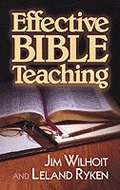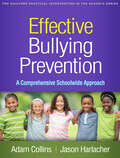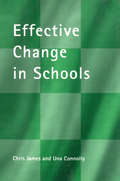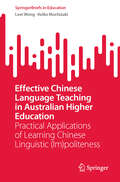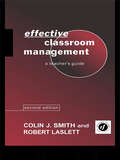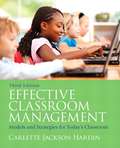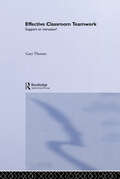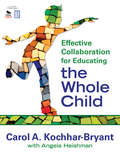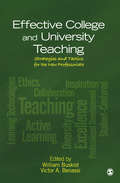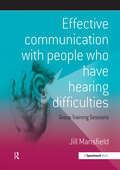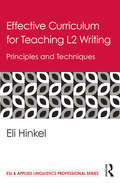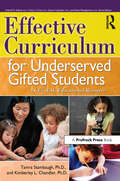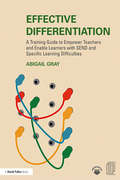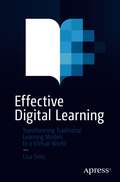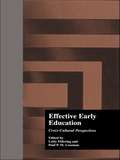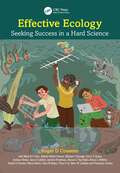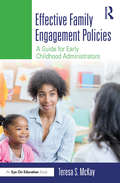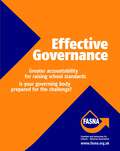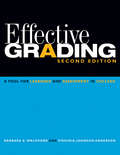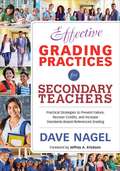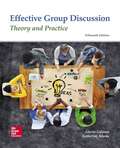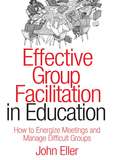- Table View
- List View
Effective Bible Teaching
by Leland Ryken Jim Wilhoit James C. WilhoitShows teachers how to develop the "big idea" of a passage, improve their classroom skills, and allow the text itself to suggest creative teaching methods.
Effective Bullying Prevention: A Comprehensive Schoolwide Approach (The Guilford Practical Intervention in the Schools Series)
by Adam Collins Jason HarlacherGoing beyond other bullying prevention resources, this book presents an approach grounded in evidence-based best practices, together with concrete guidance for weaving it sustainably into the fabric of a school. The authors describe a range of ways to support the development of prosocial skills in K–12 students, make data-based decisions to respond to bullying, and build partnerships across students, staff, and families. Of crucial importance, the book explains how to ensure that bullying prevention efforts are implemented with fidelity and do not fade away over time. An in-depth case study illustrates what effective implementation looks like in the school setting. The large-size format facilitates photocopying; reproducible tools to support implementation can be downloaded and printed for repeated use. This book is in The Guilford Practical Intervention in the Schools Series, edited by Sandra M. Chafouleas.
Effective Change in Schools (School Leadership)
by Chris James Una ConnollyFocusing on the Improving Schools Project in South Wales, Effective Change in Schools explores the process of successful and substantial educational change. The 32 schools which took part in the project all made significant changes in their practice in order to improve pupil achievement. This book describes and analyses the central features of that educational transformation process.The authors include:*information about the project, its aims and purposes*fresh and innovative perspective on the change process in schools and the leadership and management of change*examination of the key aspects of school effectiveness and improvement*description of the strategies adopted by the schools to initiate change and an outline of the issues that the schools faced as they attempted to move forward*consideration of the role of leadership in educational transformation and the essence of the successful leader.This is an invaluable guide to anyone endeavouring to bring about change in their own school or who has an interest in educational management and leadership.
Effective Chinese Language Teaching in Australian Higher Education: Practical Applications of Learning Chinese Linguistic (Im)politeness (SpringerBriefs in Education)
by Keiko Mochizuki Leei WongThis book focuses on teaching and learning Chinese linguistic (im)politeness and bridges the gap between research on Chinese linguistic (im)politeness and the context of teaching Chinese as an international language. Specifically, it investigates the pragmatics of (im)politeness, focusing on how (im)politeness is presented in current textbooks, and includes a comparative analysis of the treatment and explanation of (im)politeness and politeness strategies within these textbooks. Additionally, the various chapters examine instructors&’ and lecturers&’ perceptions of teaching and learning linguistic (im)politeness. By filling in a research gap in the teaching and learning of Chinese linguistic (im)politeness, this book provides valuable insights and perspectives on the practical applications of politeness strategies in additional language teaching.
Effective Classroom Management: A Teacher's Guide
by Colin Smith Robert LaslettThis latest new edition of Effective Classroom Management is written for new teachers and those who train and guide them. It combines sound practical advice on lesson organisation and teaching methods with an exploration of teachers' feelings about themselves and the children they teach. In this second edition, classroom management is considered from four aspects: management in the classroom; mediation with individuals; modification of behaviour and monitoring school discipline.
Effective Classroom Management: Models and Strategies for Today's Classrooms
by Carlette Jackson HardinThis core text for a course on classroom management can also be used for staff development programs for teachers at all levels. The goal is to help teachers develop an individualized classroom management plan that suits each reader's unique educational philosophy. The book begins by reviewing the research base on classroom management, then examines different models of classroom management as discipline, as a system, and as instruction, showing how each of the models addresses current INTASC standards. Some of the models covered include positive behavior support (new to this edition), logical consequences, and peer mediation. The final section provides guidelines for developing a personal system based on research-based best practices, with a new chapter offering nine proven strategies. Chapters feature scenarios, summaries, reflection questions, and activities, plus links to MyEducationLab, which includes cases and interactive simulations. This third edition presents new advice on dealing with difficult students and new tips provided by state teachers of the year. Hardin teaches education at Austin Peay State University. Annotation ©2011 Book News, Inc. , Portland, OR (booknews. com)
Effective Classroom Teamwork: Support or Intrusion?
by Gary ThomasThe nature of classroom practice is undergoing change as more and more adults are being brought into classrooms in response to such trends as parental involvement and the integration of children with special educational needs. The parents, teachers, ancillary staff and support workers comprising these new groups probabley fail to recognise themselves as teams, but nonetheless they are characterised by the same stresses which mark teamwork in any oter setting. This book is a guide to working together as an effective team, designed to show that they are part of a team, and employ strategies to minimise chances of failure. Gary Thomas identifies key areas of concern, including poor communication, status barriers and inadequate role definition, and offers guidelines for dealing with these stresses and tensions in teamwork.
Effective Collaboration for Educating the Whole Child
by Carol A. Kochhar-Bryant Angela S. HeishmanEducate the whole child by building a culture of collaboration in your school! This book for K–12 general and special education teachers, administrators, and student support specialists explores how to make collaboration and coordination work, who takes responsibility for the process, and why collaboration is central to improving outcomes for students with complex learning needs. The author: Discusses the roles, responsibilities, and relationships between school professionals, community agencies, and service providers Offers case examples as real-world illustrations of collaboration Emphasizes important developmental transitions from the elementary years through high school and after
Effective College and University Teaching: Strategies and Tactics for the New Professoriate
by William F. Buskist Dr Victor A. BenassiUsing empirical research, Effective College and University Teaching: Strategies and Tactics for the New Professoriate gives faculty and graduate teaching assistants the tools for understanding why certain teaching practices work and how to adjust their teaching to changing classroom room and online environments. The majority of books on college and university teaching are "how to" books. This book takes a unique approach and provides both the rationale and a detailed guide for how to use and teach these practices to others. Written by leading scholars and expert master teachers, this book outlines, reviews, and discusses the best practices for preparing graduate students to become effective in their duties as teaching assistants and as teachers of record and for new faculty teaching earlier in their careers. The book provides full coverage of those topics central to developing efficacious training practices aimed at the professional development of teachers at the college and university level.
Effective Communication with People Who Have Hearing Difficulties: Group Training Sessions
by Jill MansfieldOne in seven people in the UK are said to be deaf or hard of hearing. Too often, clients are put off attending centres or have had bad experiences of services and communicating with care or teaching staff. Working through the sessions in this book will enable the reader to understand how to communicate effectively, how to treat individuals with respect and dignity in all types of settings, and how to encourage positive communication with people who have hearing difficulties. The author has used her own experience of deafness to convey the effects it can have on individuals and to give insight into how people with hearing difficulties like to communicate and be treated. Divided into twenty sessions for group training, individuals can also work through the book on their own. The information, exercises, and case studies in this book will provide the reader with the awareness and knowledge to communicate effectively with people who have hearing difficulties. Featuring many cartoon-style illustrations, this photocopiable manual is essential reading for anyone who comes into contact with people who have hearing problems.
Effective Curriculum Management: Co-ordinating Learning in the Primary School
by Neil Kitson John O’NeillWritten by experienced teachers and teacher trainers, this book focuses on: *the issues which curriculum co-ordinators need to consider *how best to manage the learning of pupils within the school *how to promote a quality curriculum across the key stages *factors affecting the wider curriculum such as IT, differentiation, the use of outside agencies and the role of the head teacher. It also takes each subject area in turn and for each examines the key areas of: *knowledge, skills and understanding *teaching styles *learning approaches
Effective Curriculum for Teaching L2 Writing: Principles and Techniques (ESL & Applied Linguistics Professional Series)
by Eli HinkelEffective Curriculum for Teaching L2 Writing sets out a clear big picture for curricular thinking about L2 writing pedagogy and offers a step-by-step guide to curriculum design with practical examples and illustrations. Its main purpose is to help pre-service and practicing teachers design courses for teaching academic writing and to do this as efficiently and effectively as possible. Bringing together the what and the how-to with research-based principles, what sets this book apart is its overarching focus on language pedagogy and language building. Part 1 examines curricular foundations in general and focuses on what is socially valued in L2 writing and pedagogy at school and at the college and university level. Part 2 is concerned with the nitty-gritty̶—the daily realities of curricular design and classroom instruction. Part 3 takes a close look at the key pedagogical ingredients of teaching academic L2 writing: vocabulary and collocations, grammar for academic writing, and down-to-earth techniques for helping L2 writers to organize discourse and ideas. The Appendix provides an extensive checklist for developing curricula for a course or several courses in language teaching.
Effective Curriculum for Underserved Gifted Students: A CEC-TAG Educational Resource
by Kimberley Chandler Tamra StambaughEffective Curriculum for Underserved Gifted Students explains the need for a differentiated curriculum for gifted students typically underrepresented in gifted programs, including children of poverty and those who are from culturally and linguistically diverse populations. Features of research-based curriculum found to be effective in enhancing the academic achievement of these populations are highlighted. In addition, practical, evidence-based strategies for curriculum development and instruction are shared.
Effective Differentiation: A Training Guide to Empower Teachers and Enable Learners with SEND and Specific Learning Difficulties
by Abigail GrayPacked full of prompts, activities and practical ideas, this accessible and realistic guide provides teachers with a rich portfolio of strategies to ensure inclusion, and promote the learning of Special Educational Needs (SEN) pupils in the mainstream classroom. Unpacking SEN, demystifying jargon, and clarifying policy and good practice, Effective Differentiation encourages its reader to take a proactive approach to developing knowledge and skills in relation to Special Educational Needs Disability (SEND). Chapters address the challenges involved in successfully differentiating teaching to meet the diverse needs of individual children, and translate current research and policy into easy-to-understand concepts, integrating these into a framework for practical application. Taking self-evaluation as a starting point, the reader is invited to think, reflect, understand and finally – do! The perfect aid for the busy teacher, each chapter contains checklists and photocopiable tables which readers can use to record and track their own progress.
Effective Digital Learning: Transforming Traditional Learning Models to a Virtual World
by Lisa SimsTraditional learning as we know it has evolved. Gone are the days when students need to travel to a physical location to learn. With the increase of mobile devices and broadband Internet services, learning can take place anywhere at any time. Effective Digital Learning is here to help you make the paradigm shift with ease. More technology resources are available than ever to help people and organizations affordably present their information online. But, are they as optimized as they can be? Author Lisa Sims provides engaging and insightful tools and tips for delivering content online. Transform your traditional learning models and enhance your online learning models to fit the virtual world with Effective Digital Learning. Many organizations have recently made the jump from in-person conferences and training to providing all-virtual environments in order to keep employees, volunteers, and attendees safe and connected. Stay secure with the most up-to-date knowledge so that you, your organizations, and learners are always prepared. Whether you are a teacher, entrepreneur, or speaker, Effective Digital Learning is the ideal roadmap to have at your side on this innovative new journey. What You Will LearnDiscover how online learning can be an effective method of delivering information to target audiences Think outside the box when it comes to delivering content onlineStructure online learning to engage target audiencesWho This Book Is ForTeachers, entrepreneurs, speakers, and business owners (big and small) who are interested in delivering their knowledge via online platforms, but lack the technical expertise to make it happen.
Effective Early Childhood Education: Cross-Cultural Perspectives (Studies in Education and Culture #Vol. 11)
by Lotty ElderingThis work examines international strategies of early education and literacy for disadvantaged children, from a cross-cultural perspective. It brings together theoretical insights, the results of empirical research, and experiences with early educational intervention programmes.
Effective Ecology: Seeking Success in a Hard Science
by Roger D. CousensEcology is one of the most challenging of sciences, with unambiguous knowledge much harder to achieve than it might seem. But it is also one of the most important sciences for the future health of our planet. It is vital that our efforts are as effective as possible at achieving our desired outcomes. This book is intended to help individual ecologists to develop a better vision for their ecology – and the way they can best contribute to science. The central premise is that to advance ecology effectively as a discipline, ecologists need to be able to establish conclusive answers to key questions rather than merely proposing plausible explanations for mundane observations. Ecologists need clear and honest understanding of how we have come to do things the way we do them now, the limitations of our approaches, our goals for the future and how we may need to change our approaches if we are to maintain or enhance our relevance and credibility. Readers are taken through examples to show what a critical appraisal can reveal and how this approach can benefit ecology if it is applied more routinely.Ecological systems are notable for their complexity and their variability. Ecology is, as indicated by the title of this book, a truly difficult science. Ecologists have achieved a great deal, but they can do better. This book aims to encourage early-career researchers to be realistic about their expectations: to question everything, not to take everything for granted, and to make up their own minds.
Effective Family Engagement Policies: A Guide for Early Childhood Administrators
by Teresa S. McKayAligned with the National Association for the Education of Young Children’s Principles of Effective Family Engagement, this book helps early childhood administrators create effective family engagement policies that work. For each of the six key principles, this accessible guide walks leaders through the process of creating effective policy to engage families in their program. Filled with workable documents and templates to thoroughly scaffold the entire process, administrators will finish the work ready to implement the policies created, or build a plan tailored to their specific program. Designed for schools discouraged by the lack of engagement with all families, this book helps leaders strengthen the bond among home, school, and community.
Effective Governance: Greater Accountability for Raising School Standards: Is Your Governing Body Prepared for the Challenge?
by Joan BinderDo you know how school inspectors will be judging effectiveness? Have you considered how you can demonstrate the effectiveness of your governing body? This new guide takes a practical approach, with key questions, key actions and key information supported by case studies of good practice from a wide variety of schools. It will provide you with support and guidance in undertaking the responsibilities of governance. Each section links to the new Ofsted criteria, provides you with an understanding of 'effectiveness' and a framework of questions and actions which you can use to review your current practice and focus your professional development as a governing body. The case studies are centred on a key question from the relevant section and provide you with a 'live' example of how a school is demonstrating effectiveness.
Effective Governance: Greater Accountability for Raising School Standards: Is Your Governing Body Prepared for the Challenge?
by Joan BinderDo you know how school inspectors will be judging effectiveness? Have you considered how you can demonstrate the effectiveness of your governing body? This new guide takes a practical approach, with key questions, key actions and key information supported by case studies of good practice from a wide variety of schools. It will provide you with support and guidance in undertaking the responsibilities of governance. Each section links to the new Ofsted criteria, provides you with an understanding of 'effectiveness' and a framework of questions and actions which you can use to review your current practice and focus your professional development as a governing body. The case studies are centred on a key question from the relevant section and provide you with a 'live' example of how a school is demonstrating effectiveness.
Effective Grading
by Anderson Walvoord Barbara E. Virginia JohnsonThis new edition of the classic book has been thoroughly updated and revised with the latest research. The book offers a hands-on guide for evaluating student work and examines the link between teaching and grading. The authors show how to integrate the grading process with course objectives and offer a wealth of information about student learning. The book also includes information on integration of technology and online teaching, and is filled with more illustrative examples, including a sample syllabus. This revised resource can help any professor enrich student learning in the classroom.
Effective Grading Practices for Secondary Teachers: Practical Strategies to Prevent Failure, Recover Credits, and Increase Standards-Based/Referenced Grading
by Dave NagelEnact innovative grading systems that more accurately describe student progress! This book challenges traditional grading practices and provides alternatives that can have direct impact on student success. By making subtle shifts toward standards based grading systems, schools can reduce unnecessary course failures, provide students and their families a more accurate picture of current progress, and increase opportunities for success. The author offers a range of grading reform strategies that are built from practical frameworks that are effective and simple to adapt. Among the many strengths of this book are: Practical application of existing research and evidence base for effective secondary grading reforms A framework for schools and districts to apply and adapt failure prevention strategies such as early failure detection, Amnesty Days, and meaningful stipulated second chance opportunities for students to reach mastery Functional strategies and actions for shifting toward standards-based (referenced) grading without entirely abandoning letter grades Countering resistance to change through a-clearly-articulated plan for conducting school-wide and classroom level action research around the effectiveness of new or adjusted grading practices "Informative and pragmatic, this book is spot on with analysis of this elephant in the room issue. Nagel uses both empathy and humor in getting to the heart of a process to generate real solutions while underscoring the ultimate need for teacher voice in any successful implementation. He provides ready-made strategies for real, impactful change. I′m left hopeful that feedback will rule the day!" —Bruce Potter, Superintendent Berkshire UFSD "Nagel offers an insightful and articulate voice to secondary improvement and alignment through grading practices. His tried and true methods through working with real districts provides a starting place and examples for others to follow. A must-read for anyone serious about ensuring student engagement through meaningful feedback." —Debra K. Howe, Superintendent Tri-Creek School Corporation ?
Effective Grading Practices for Secondary Teachers: Practical Strategies to Prevent Failure, Recover Credits, and Increase Standards-Based/Referenced Grading
by Dave NagelEnact innovative grading systems that more accurately describe student progress! This book challenges traditional grading practices and provides alternatives that can have direct impact on student success. By making subtle shifts toward standards based grading systems, schools can reduce unnecessary course failures, provide students and their families a more accurate picture of current progress, and increase opportunities for success. The author offers a range of grading reform strategies that are built from practical frameworks that are effective and simple to adapt. Among the many strengths of this book are: Practical application of existing research and evidence base for effective secondary grading reforms A framework for schools and districts to apply and adapt failure prevention strategies such as early failure detection, Amnesty Days, and meaningful stipulated second chance opportunities for students to reach mastery Functional strategies and actions for shifting toward standards-based (referenced) grading without entirely abandoning letter grades Countering resistance to change through a-clearly-articulated plan for conducting school-wide and classroom level action research around the effectiveness of new or adjusted grading practices "Informative and pragmatic, this book is spot on with analysis of this elephant in the room issue. Nagel uses both empathy and humor in getting to the heart of a process to generate real solutions while underscoring the ultimate need for teacher voice in any successful implementation. He provides ready-made strategies for real, impactful change. I′m left hopeful that feedback will rule the day!" —Bruce Potter, Superintendent Berkshire UFSD "Nagel offers an insightful and articulate voice to secondary improvement and alignment through grading practices. His tried and true methods through working with real districts provides a starting place and examples for others to follow. A must-read for anyone serious about ensuring student engagement through meaningful feedback." —Debra K. Howe, Superintendent Tri-Creek School Corporation ?
Effective Group Discussion: Theory and Practice
by Katherine L. Adams Gloria J. GalanesNow in its fifteenth successful edition, Effective Group Discussion combines the most recent research findings and practical tools students need to become productive group members. A variety of secondary groups are covered in the text: work groups, committees, task forces, self-directed work teams, and other small groups whose objectives include finding solutions to problems, producing goods, and creating policies.
Effective Group Facilitation in Education: How to Energize Meetings and Manage Difficult Groups
by John F. EllerTap into proven do's and don'ts for facilitating dynamic and productive meetings. Get tips on team building, brainstorming, motivating, delegating, and more.
